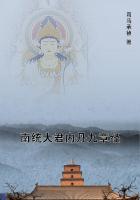THE Capitan's house faced the east. Just as day broke, and the light streamed in at the open door, Ramona's eyes unclosed. Felipe and Aunt Ri were both by her side. With a look of bewildered terror, she gazed at them.
"Thar, thar, naow! Yer jest shet yer eyes 'n' go right off ter sleep agin, honey," said Aunt Ri, composedly, laying her hand on Ramona's eyelids, and compelling them down. "We air hyar, Feeleepy 'n' me, 'n' we air goin' ter stay. I allow yer needn't be afeerd o' nothin'. Go ter sleep, honey."
The eyelids quivered beneath Aunt Ri's fingers. Tears forced their way, and rolled slowly down the cheeks. The lips trembled; the voice strove to speak, but it was only like the ghost of a whisper, the faint question that came,-- "Felipe?"
"Yes, dear! I am here, too," breathed Felipe; "go to sleep. We will not leave you!"
And again Ramona sank away into the merciful sleep which was saving her life.
"Ther longer she kin sleep, ther better," said Aunt Ri, with a sigh, deep-drawn like a groan. "I allow I dread ter see her reely come to.
'T'll be wus'n the fust; she'll hev ter live it all over again!"
But Aunt Ri did not know what forces of fortitude had been gathering in Ramona's soul during these last bitter years. Out of her gentle constancy had been woven the heroic fibre of which martyrs are made; this, and her inextinguishable faith, had made her strong, as were those of old, who "had trial of cruel mocking, wandering about, being destitute, afflicted, tormented, wandered in deserts and in mountains, and in dens and caves of the earth."
When she waked the second time, it was with a calm, almost beatific smile that she gazed on Felipe, and whispered, "How did you find me, dear Felipe?" It was rather by the motions of her lips than by any sound that he knew the words. She had not yet strength enough to make an audible sound. When they laid her baby on her breast, she smiled again, and tried to embrace her, but was too weak. Pointing to the baby's eyes, she whispered, gazing earnestly at Felipe, "Alessandro." A convulsion passed over her face as she spoke the word, and the tears flowed.
Felipe could not speak. He glanced helplessly at Aunt Ri, who promptly responded: "Naow, honey, don't yeow talk. 'Tain't good fur ye; 'n' Feeleepy 'n' me, we air in a powerful hurry ter git yer strong 'n' well, 'n' tote ye out er this --" Aunt Ri stopped. No substantive in her vocabulary answered her need at that moment. "I allow ye kin go 'n a week, ef nothin' don't go agin ye more'n I see naow; but ef yer git ter talkin', thar's no tellin' when yer'll git up.
Yeow jest shet up, honey. We'll look arter everythin'."
Feebly Ramona turned her grateful, inquiring eyes on Felipe. Her lips framed the words, "With you?"
"Yes, dear, home with me," said Felipe, clasping her hand in his. "I have been searching for you all this time."
An anxious look came into the sweet face. Felipe knew what it meant. How often he had seen it in the olden time. He feared to shock her by the sudden mention of the Senora's death; yet that would harm her less than continued anxiety. "I am alone, dear Ramona," he whispered. "There is no one now but you, my sister, to take care of me. My mother has been dead a year."
The eyes dilated, then filled with sympathetic tears. "Dear Felipe!" she sighed; but her heart took courage. Felipe's phrase was like one inspired; another duty, another work, another loyalty, waiting for Ramona. Not only her child to live for, but to "take care of Felipe"!
Ramona would not die! Youth, a mother's love, a sister's affection and duty, on the side of life,-- the battle was won, and won quickly, too.
To the ****** Cahuillas it seemed like a miracle; and they looked on Aunt Ri's weather-beaten face with something akin to a superstitious reverence. They themselves were not ignorant of the value of the herb by means of which she had wrought the marvellous cure; but they had made repeated experiments with it upon Ramona, without success. It must be that there had been some potent spell in Aunt Ri's handling. They would hardly believe her when, in answer to their persistent questioning, she reiterated the assertion that she had used nothing except the hot water and "old man," which was her name for the wild wormwood; and which, when explained to them, impressed them greatly, as having no doubt some significance in connection with the results of her preparation of the leaves.















